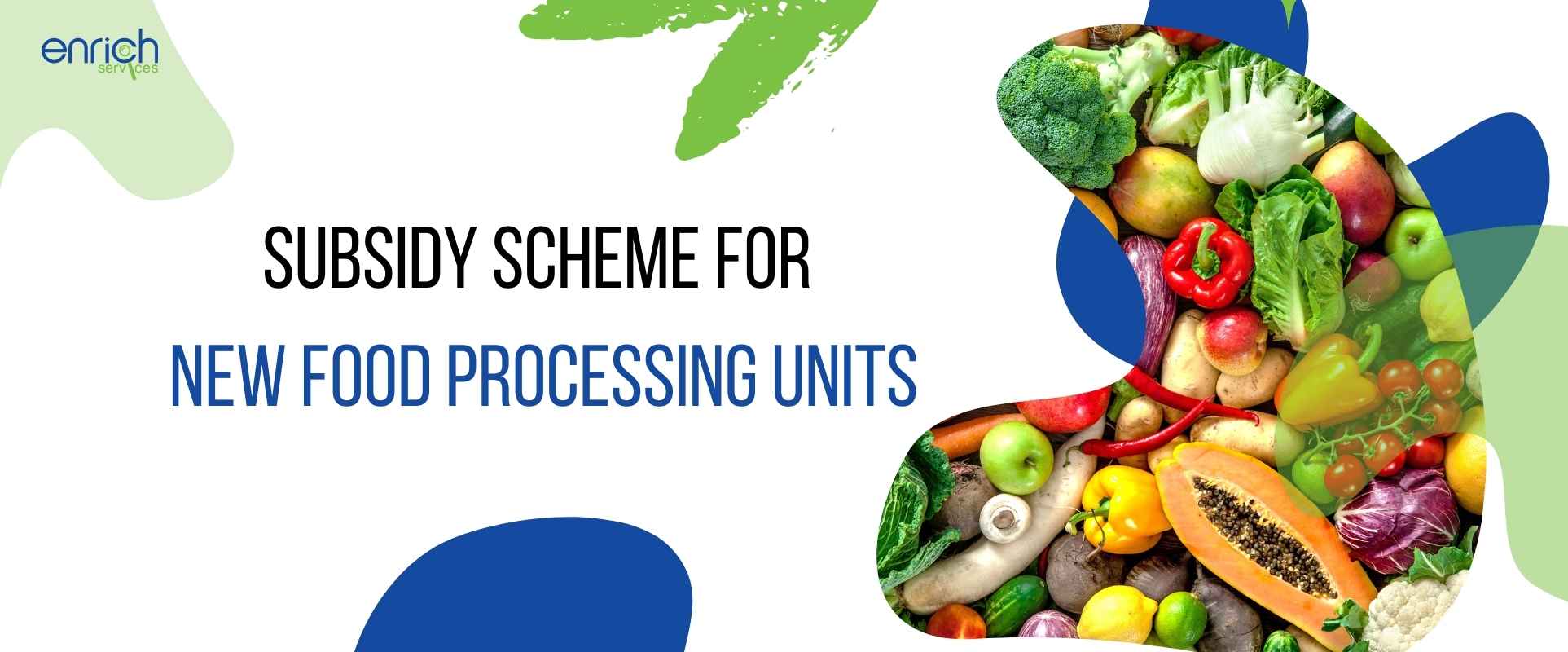Subsidy Scheme for new Food Processing Units

Objectives and results
The creation of preserving and processing capacities and modernization or expansion of existing food-producing units helps in increasing the level of processing, adding values, and which helps in leading to reduction of food loss for creation or development of food processing and those who have preservation capacities. Also, it results in the enhancement of farmers’ income.
Eligible sectors for the scheme
The eligible sectors for this particular scheme are milk processing, ready-to-eat, ready-to-cook products, meat/ poultry/ fish processing, fruits and vegetable processing, breakfast/cereals/ snacks/ bakery products, and other nutritional products, Modern rice miling, fruits/honey-based wine, jaggery from sugarcane, natural food flavors, guar gum, cocoa powder, food additives or food extracts and colors, food products which fit for human consumption, animal feed manufacturing unit, milk processing and many other products come in this sector.
Eligible processing activities
Blanching, crushing, pulping, washing, peeling, drying, splitting, de-hulling, deseeding, de-husking, decoding, sorting, grading, washing, extrusion, color sorting, cutting, seizing, peeling, pasteurization, dehydration, freeze-drying, evaporation, concentration, pickling, chemical preservation, fermentation, blast freezing, plate freezing, quick spiral freezing, Individual quick freezing, controlled temperature transport like coolers and refrigerated, fire fighting equipment and insect repellent and many more.
Eligible location of the project
The proposals under the Scheme will be considered both inside Mega Food Parks (MFPs)/ Agro-processing Clusters (APCs) and anywhere outside MFPs/ APCs. As far as practicable, out of total fund allocation, 60% will be for units inside MFPs/APCs and 40% to units outside MFPs/APCs.
Eligibility criteria
Net worth: The combined net worth of the applicant shall not be less than 1.5 times of grants-in-aid sought under the scheme.
Pattern of Assistance
Grants-in-aid will be 35% of eligible project cost for projects in General Areas and @50% of eligible project cost for projects in Difficult Areas as well as for projects of SC/ST. FPOs and SHGs subject to a maximum of Rs.5 crore.
Application filing and documents required:
On the Sampada portal of the ministry, all the applications should be submitted. The application is in online mode only because no physical application is accepted, or if introduced like that, it’ll be ignored.
The documents required are: The documents you submit online should be self-attested on all the paper pages by the applicant or its authorized signatory. If the applicant gets delayed in submitting the proposal, then the ministry will not be responsible. Proposals may be rejected if incomplete or decimated documents are. Submitted. Based on preference criteria, merit and evaluation of submission by Grants-aid will be sanctioned as per assessment criteria. If the original documents are in a regional language, the applicant should make it self-certified in English or Hindi.
Release of grant
Subsidy will be released in two equal installments.
Schedule and timelines:
The completion time and project operation from the date of issue of the approval letter will be around 18 months. There is a particular schedule for submission of claims for release of instalments which is like for the 1stinstallment, it’s nine months, and for the 2nd installment it’s 18 months. Also, the schedule can get extended beyond the period by the ministry’s secretary. Extension upto six months can happen in the completion of projects getting delayed; the tasks may be granted by the concerned additional secretary or joint secretary of the ministry. Project approval authority gives the Extension of two months, as per subclause (a) above, deduction in grants-in-aid based on the implementation schedule. The maximum time for which an Extension is granted is about six months which comes under c and d clauses with the Financial Advisor of the ministry in consultation.
Components & projects in which the change will take place
Change in the bank, Change in finance, change in location of facilities ( other than main facility/ centre), reduction in project components, change in shareholding patterns, decrease in eligible project cost, board of directors. Also, there is a change in features or projects.
Before the release of installments, documents are required:
Certificate from a chartered accountant in the prescribed format (Annexure-5), which confirms cumulative Expenditure of 50% of eligible project cost
Certificate from chartered mechanical engineer which is countersigned by PIA or authorised signatory in the prescribed format of (Annexure-6)
Change land use
Geo-tagged photographs of projects
Certification from a chartered accountant
Details of three bank accounts
ECS mandate form in the format of Annexure-4
And many more documents are mentioned on the website.
Performance Security and Fee
The entitled submitting for financial assistance should submit nonrefundable fees of about 20,000 in favor of “Pay and Accounts Officer, Ministry of Food Processing Industries, New Delhi” through DD ( Demand Draft). But if you’re from SC/ ST, the nonrefundable fees are about 15,000.
The successful applicant should submit a refundable bank guarantee after being selected for financial assistance by the ministry, which is validated for 60 days after completion of the project and can be extended for 60 days beyond the revised completion of projects for the people who are 5% eligible.
Ineligible items for Grants-in-aid
Canteen, security or guard room, compound wall, cost of land and site development, Expenditure on a painting of machinery, pre-operating expenses, approach road or internal roads, Ac ducting, furniture, computers and allied office items, closed-circuit TV camera and security system-related equipment, stationery item, flycatchers, hand-washer, laundry, fuel, consumables, spares and stores, labor rest room and quarters for workers, non-technical civil works not related to components of scheme, service charges, carriage and freight charges, reconditioned old plant and machinery, transport vehicles with controlled temperature and many more.
Authors Bio:-

